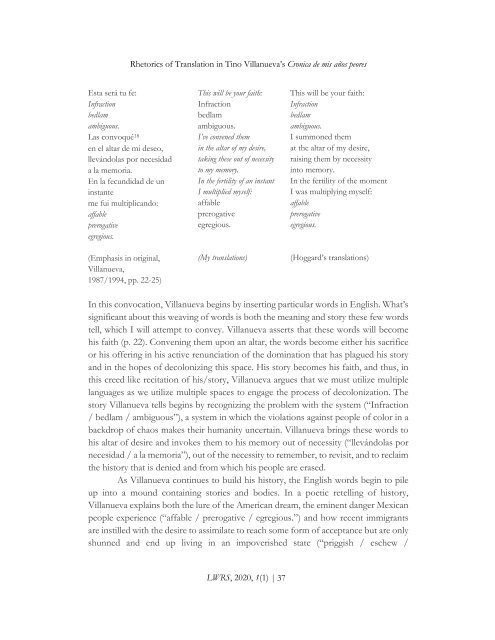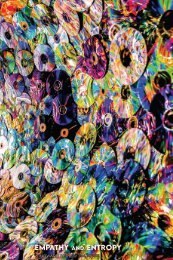LWRS June 2020 Volume 1, Issue 1
Inaugural Issue co-edited by Yndalecio Isaac Hinojosa and Isabel Baca
Inaugural Issue co-edited by Yndalecio Isaac Hinojosa and Isabel Baca
You also want an ePaper? Increase the reach of your titles
YUMPU automatically turns print PDFs into web optimized ePapers that Google loves.
Rhetorics of Translation in Tino Villanueva’s Cronica de mis años peores<br />
Esta será tu fe:<br />
Infraction<br />
bedlam<br />
ambiguous.<br />
Las convoqué 18<br />
en el altar de mi deseo,<br />
llevándolas por necesidad<br />
a la memoria.<br />
En la fecundidad de un<br />
instante<br />
me fui multiplicando:<br />
affable<br />
prerogative<br />
egregious.<br />
(Emphasis in original,<br />
Villanueva,<br />
1987/1994, pp. 22-25)<br />
This will be your faith:<br />
Infraction<br />
bedlam<br />
ambiguous.<br />
I’ve convened them<br />
in the altar of my desire,<br />
taking these out of necessity<br />
to my memory.<br />
In the fertility of an instant<br />
I multiplied myself:<br />
affable<br />
prerogative<br />
egregious.<br />
(My translations)<br />
This will be your faith:<br />
Infraction<br />
bedlam<br />
ambiguous.<br />
I summoned them<br />
at the altar of my desire,<br />
raising them by necessity<br />
into memory.<br />
In the fertility of the moment<br />
I was multiplying myself:<br />
affable<br />
prerogative<br />
egregious.<br />
(Hoggard’s translations)<br />
In this convocation, Villanueva begins by inserting particular words in English. What’s<br />
significant about this weaving of words is both the meaning and story these few words<br />
tell, which I will attempt to convey. Villanueva asserts that these words will become<br />
his faith (p. 22). Convening them upon an altar, the words become either his sacrifice<br />
or his offering in his active renunciation of the domination that has plagued his story<br />
and in the hopes of decolonizing this space. His story becomes his faith, and thus, in<br />
this creed like recitation of his/story, Villanueva argues that we must utilize multiple<br />
languages as we utilize multiple spaces to engage the process of decolonization. The<br />
story Villanueva tells begins by recognizing the problem with the system (“Infraction<br />
/ bedlam / ambiguous”), a system in which the violations against people of color in a<br />
backdrop of chaos makes their humanity uncertain. Villanueva brings these words to<br />
his altar of desire and invokes them to his memory out of necessity (“llevándolas por<br />
necesidad / a la memoria”), out of the necessity to remember, to revisit, and to reclaim<br />
the history that is denied and from which his people are erased.<br />
As Villanueva continues to build his history, the English words begin to pile<br />
up into a mound containing stories and bodies. In a poetic retelling of history,<br />
Villanueva explains both the lure of the American dream, the eminent danger Mexican<br />
people experience (“affable / prerogative / egregious.”) and how recent immigrants<br />
are instilled with the desire to assimilate to reach some form of acceptance but are only<br />
shunned and end up living in an impoverished state (“priggish / eschew /<br />
<strong>LWRS</strong>, <strong>2020</strong>, 1(1) | 37





